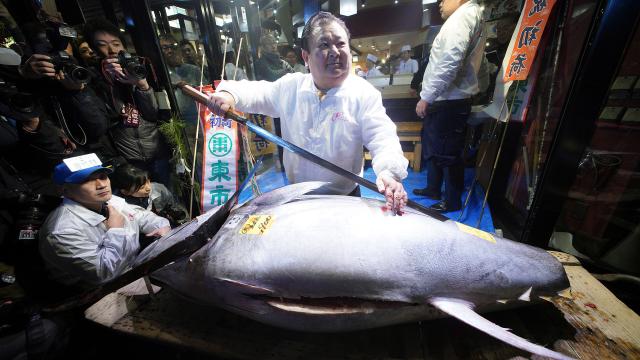A Japanese restaurateur set a record on Saturday by paying nearly $4 million (333.6 million yen) for a massive, 278kg Pacific bluefin tuna at the first auction of the year of Tokyo’s Toyosu fish market, and almost immediately conceded that perhaps he should not have paid that much, Reuters reported.
Sushizanmai chain owner Kiyoshi Kimura—who held the same record for six straight years until he was outbid last year — apparently paid over $7,020 a pound for the fish. That is very much a huge premium above the going rate of $56 per kilogram at the since-closed Tsukiji market in 2018 quoted by the Associated Press. Talking with reporters, Reuters wrote, Kimura said that he maybe “did too much” and probably paid five times as much as he originally intended:
“The tuna looks so tasty and very fresh, but I think I did too much,” Kimura told reporters outside the market later.
“I expected it would be between 30 million and 50 million yen, or 60 million yen at the highest, but it ended up five times more.”
(Fortunately for Kimura’s wallet, his company Kiyomura Corp. will be footing the bill.)
Bluefin tuna used to be a relatively undesirable catch of fish, but it has surged in popularity thanks to its use in sushi and sashimi. According to NPR, some estimates peg the Pacific species’ current population level at just 2.6 per cent of historic levels; the IUCN Red List categorizes it as threatened, while the Atlantic bluefin is endangered and the southern bluefin critically endangered.
Groups that manage the Pacific species reached an agreement in 2017 to attempt to grow population levels to 20 per cent of historic levels by the mid-2030s, and according to the AP, “Japan has begun enforcing laws banning catches that exceed quotas, with violators subject to fines or possible jail time.” (Less encouraging: The U.S. government rejected an attempt to reclassify the Pacific species as endangered that year.)
However, as the Atlantic noted in 2014, record-setting prices for bluefin are much less about low stocks of the best-quality fish than about publicity.
Southern Fried Science’s Andrew David Thaler told the magazine that winning the first tuna auction of the year is not only considered an honour, but a great P.R. play and a reminder to upstart rivals who the biggest fish in the room really is.
“Among the patrons of the Tsukiji fish auction, it is considered an honour to buy the first bluefin of the new years, and bidding wars reflect this fight for status,” Thaler told the Atlantic. “…. As many auction-goers know, landing a high, early win is a way of marking your territory and letting your competitors know that you have the bankroll to push them out of a bidding war.”
“Obviously the price doesn’t reflect the true market price of the fish,” Jamie Gibbon of the Pew Trust’s global conservation team told the AP. “It’s wrapped in with the ceremonial aspects of the auction.”
According to NPR, when the fish is cut up, it should provide at least 12,000 pieces of sushi for Sushizanmai customers.
[Reuters]
